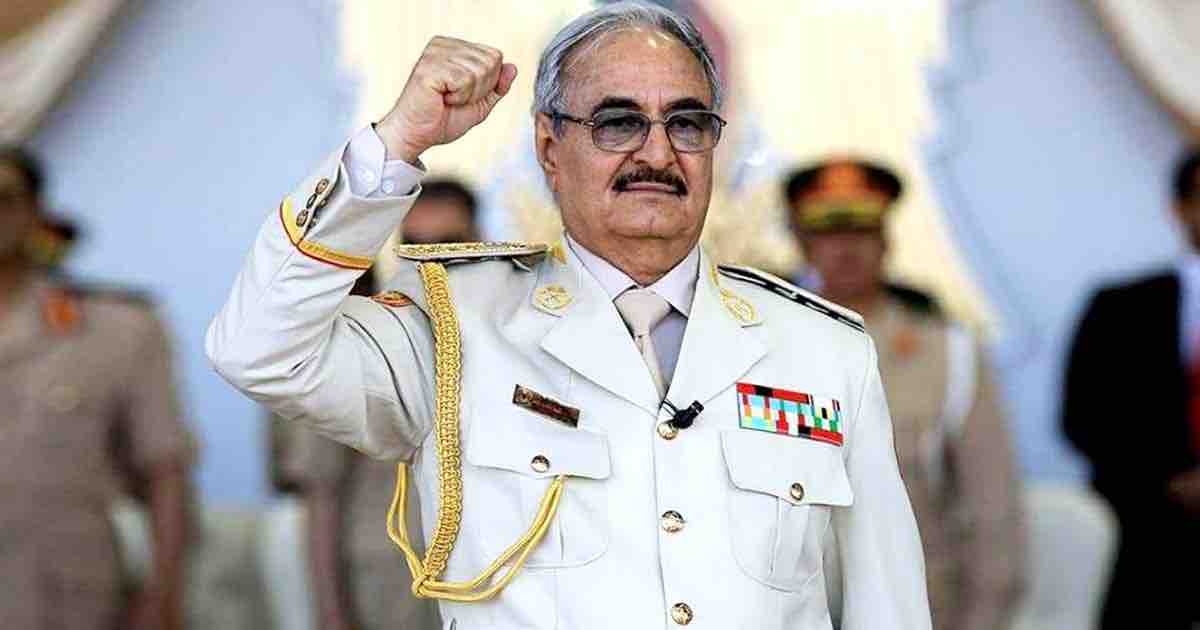Libya’s renegado military strongman, Genera Khalifa Haftar left Moscow without consenting to an arrangement that would have formalized a provisional ceasefire in the war-wracked nation, leaving the future of a fragile truce uncertain.
The commander’s abrupt departure in the early hours of Tuesday was a setback for an international diplomatic push in recent days, though Moscow insisted it would continue mediation efforts.
Libya talks in Russia fail to get ceasefire deal signed as renegade commander asks for more time to consider it https://t.co/1agi9qpqfk
— Al Jazeera News (@AJENews) January 13, 2020
Haftar and his allies were in Moscow on Monday for talks with the UN-recognised government headed by Fayez al-Sarraj and based in Tripoli.
Sarraj’s government has been under attack since last April from forces loyal to Haftar, who is based in the east of the oil-rich North African country with his own loyalist politicians.
The two sides agreed to a ceasefire brokered by Russia and Turkey that took effect at the weekend and were in Moscow to sign a long-term agreement.
The talks raised hopes of an end to the latest fighting to wrack Libya since a 2011 NATO-backed uprising killed longtime dictator Moamer Kadhafi.
But after seven hours of negotiations, only Sarraj had signed on to the agreement and Russian officials confirmed to AFP that Haftar’s delegation had left without signing the deal.
“The draft [agreement] ignores many of the Libyan army’s demands,” Haftar was quoted as saying by the Al Arabiya television network.
#Haftar and his accompanying delegation have left #Moscow tonight and there will be no signing on any document at the expense of the heroic sacrifices and aspirations of the Libyans to salvation and prevent the army.#LNA #Libya pic.twitter.com/3SPXroEwnh
— M.LNA (@LNA2019M) January 13, 2020
“We will pursue our efforts in this direction. For now, a definitive result has not been achieved,” Russian Foreign Minister Sergei Lavrov said at a press conference in Sri Lanka.
Russia, European powers and Libya’s neighbours “are working in the same vein and motivating all Libyan sides to agree rather than continue sorting things out by force”, Lavrov said.
Russian state news agency RIA Novosti quoted a source in Haftar’s stronghold Benghazi as saying he did not sign because the agreement did not spell out a timeline for disbanding groups allied with Sarraj’s Government of National Accord (GNA)
Talks on the terms of a ceasefire between Haftar’s forces and the UN-recognised government headed by Fayez al-Sarraj went on for seven hours on Monday without the two delegations actually meeting.
Sarraj’s Government of National Accord (GNA) in Tripoli has been under attack since last April from forces loyal to Haftar, who is based in the east of the oil-rich North African country with his loyalist politicians.
Calls for ‘credible’ truce
The ceasefire initiative was launched by President Vladimir Putin and Turkish counterpart Recep Tayyip Erdogan, who jointly called for a truce in Istanbul last week.
A fragile ceasefire went into effect from midnight Sunday, but Erdogan on Monday reiterated the “urgent necessity” for a permanent agreement after meeting with Italy’s prime minister.
German Chancellor Angela Merkel visited Putin on Saturday and he supported her drive to hold a peace conference sponsored by the United Nations. Berlin said Monday the summit was planned for later this month.
Russia supports Haftar as the stronger militarily and backed by its ally Egypt, said Russian defence analyst Alexei Malashenko
French President Emmanuel Macron on Monday called for a “credible, lasting and verifiable” truce.
Diplomatic sources said discussions were also underway at the United Nations about establishing an observation mission in Libya to monitor the ceasefire, similar to an existing initiative in Yemen.
“For the ceasefire in Libya to hold, there should be an impartial monitoring and implementation mechanism as well as confidence-building measures,” UN spokesman Stephane Dujarric told AFP.
The UN is already “recording and verifying reported ceasefire violations” through its political mission in Libya, which employs around 230 people, he added.
Turn page on past
Sarraj on Monday called on Libyans to “turn the page on the past, reject discord and to close ranks to move towards stability and peace”.
Since the start of Haftar’s offensive against Tripoli, more than 280 civilians and about 2,000 fighters have been killed and 146,000 Libyans have been displaced, according to the UN.
Turkey and Russia’s diplomatic initiative came despite the countries being seen as supporting opposing sides.
Read more: Historic Turk-Soviet conflict in Eastern Mediterranean: Libya pays price
Ankara dispatched troops — in a training capacity, it said — to support the GNA in January in a move criticised by European powers and US President Donald Trump.
The GNA has also signed agreements with Ankara assigning Turkey rights over a vast area of the eastern Mediterranean, in a deal denounced by France, Greece, Egypt and Cyprus.
Russia has been accused of backing pro-Haftar forces, which are supported by the United Arab Emirates, Saudi Arabia and Egypt — all regional rivals of Turkey.
Several hundred Russian mercenaries are reported to be in Libya supporting Haftar. Putin said any Russians in the country are not in Moscow’s pay.
Russia supports Haftar as the stronger militarily and backed by its ally Egypt, said Russian defence analyst Alexei Malashenko.
“Moscow wants to preserve its presence in Libya through Haftar, including its oil interests,” he said.
Russia could rekindle trade in arms and wheat and relaunch a stalled railway construction project.
Read more: Trump gives a blunt warning to Erdogan after Turkish Parliament approves sending forces to Libya
Europe and North Africa have also launched a diplomatic offensive to try to prevent Libya, with the increased involvement of international players in its conflict, from turning into what Berlin calls a “second Syria”.
King Abdullah of Jordan on Monday warned that thousands of fighters have left Syria for Libya and “that is something we in the region but also our European friends will have to address in 2020”.
AFP with additional input from GVS News Desk














